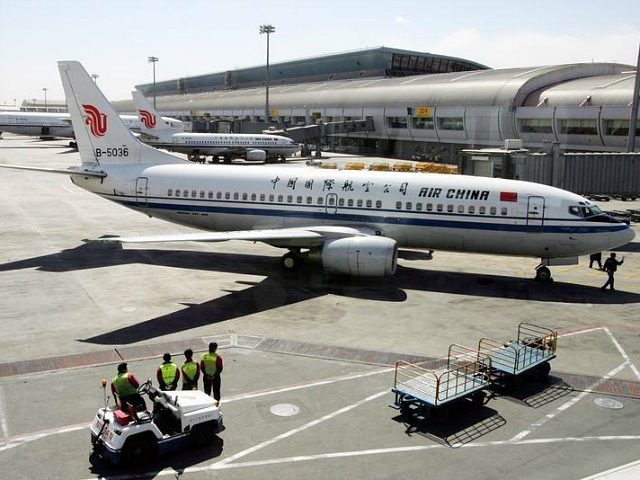Chinese state media reported on Friday that Air China has suspended flights between Beijing and Pyongyang, North Korea. The airline is the only one of its kind connecting North Korea to China regularly, suggesting Beijing is seeking to heavily limit its ties to the country.
Air China denied the CCTV report shortly after it aired, however, claiming that, instead, the airline has cut down the number of flights due to poor demand.
The original Chinese government report claimed that flights will still occur, but the airline had canceled all flights to North Korea starting Monday, as reported by the South China Morning Post. “No reason was given for the suspension but flights between the two countries have been put on hold in the past due to lack of passengers,” the newspaper notes.
China is North Korea’s largest trade partner, and many in the international community blame China for consistently offering the rogue regime of communist dictator Kim Jong-un a lifeline to maintain his government, guilty of extreme political repression and human rights violations.
Beijing has appeared increasingly open to cutting its ties with North Korea, however, recently enforcing a United Nations sanction on Pyongyang by rejecting a cargo ship delivering coal. China has reportedly recently expanded its troop presence greatly on the North Korean border, deploying 150,000 soldiers to the region.
“I think even China is beginning to recognize that this presents a threat to even China’s interests. President Xi clearly understands, and I think agrees, that the situation has intensified and has reached a certain level of threat that action has to be taken,” U.S. Secretary of State Rex Tillerson said on television last week, shortly after President Xi Jinping concluded a diplomatic visit to Florida with President Donald Trump.
Following that meeting, Trump said that he offered Xi an improved economic deal with the United States if China distanced itself from North Korea and subdued the increasingly unpredictable Kim. “You want to make a great deal? Solve the problem in North Korea,” Trump said he told Xi, adding that ending the Kim regime was “worth having not as good a trade deal as I would normally be able to make.”
On Friday, Chinese Foreign Minister Wang Yi issued statements appearing to indicate that China has prioritized subduing Kim Jong-un and preventing a sixth nuclear weapons test. “We urge all parties to refrain from inflammatory or threatening statements or deeds to prevent irreversible damage to the situation on the Korean Peninsula,” Wang said, according to the state-run news service Xinhua. “If war breaks out on the Korean Peninsula, multiple parties will lose and no one will win.”
While Chinese officials are careful to call for moderation from both North Korea and the United States at all times, the state-run Global Times newspaper made the rare move this week of warning North Korea specifically to tame its rhetoric. “The U.S. is making up its mind to stop the North from conducting further nuclear tests. It doesn’t plan to co-exist with a nuclear-armed Pyongyang,” a column in the publication read. “Pyongyang should avoid making mistakes at this time.”
The Times also referred to Trump as “willing to be regarded as a man who honors his promises.”
Among China’s concerns in confronting North Korea may be the exhausted patience of the Chinese people towards Kim Jong-un personally. While China has long regarded the fellow communist country as an ally against the United States on the world stage, Kim Jong-un’s repeated purges of China-friendly high-level officials and nuclear weapons tests have triggered some pushback among Chinese “netizens,” the term used for Chinese internet users commenting on social media.
Following North Korea’s third nuclear test in 2013, commenters on China’s social media network Sina Weibo argued that China had been humiliated by the Kim regime, after promising to curb his erratic behavior. “North Korea slapped China. China raised a dog to bite its owner,” one user wrote. Another asked: “Every Chinese person with a conscience right now is asking: Why do we support North Korea?”
Last year, China attempted to censor search engines after users began to refer to Kim Jong-un as “Jin San Pang,” or “Fatty Kim III.” The censorship on search engine Baidu and Sina Weibo was intended to yield no results when “Jin San Pang” was typed in as a search, but did not completely hide the large amount of content mocking Kim present online.

COMMENTS
Please let us know if you're having issues with commenting.